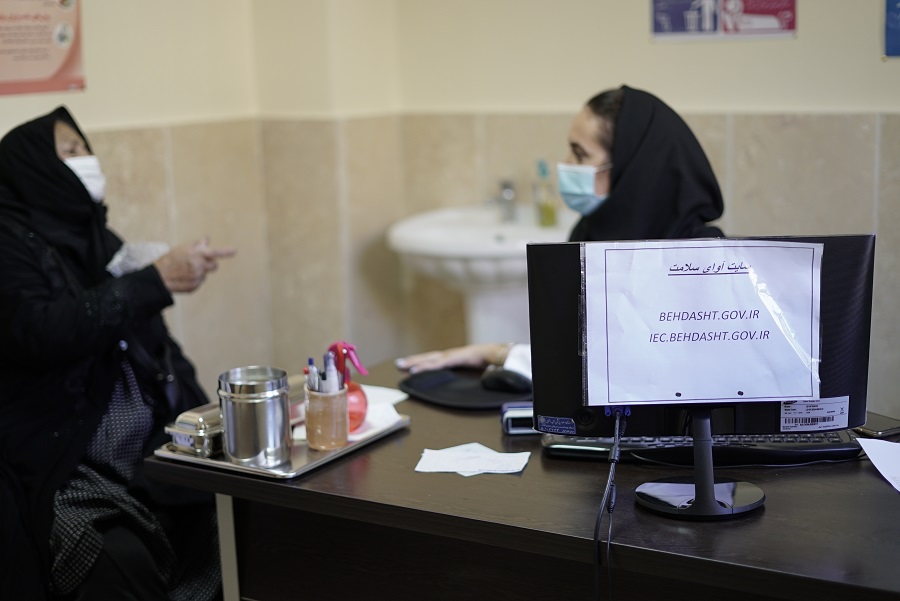
A patient consults with a health care worker at one of Tehran's primary health care centres. Credit: WHO/Islamic Republic of Iran
Sunday, 17 November 2021, Tehran – The World Health Organization (WHO) in the Islamic Republic of Iran is supporting national efforts, supervised by the Primary Health Care (PHC) Management Centre of the Ministry of Health and Medical Education and Institute For Futures Studies in Health of Kerman, to ensure patient safety in health care settings through holding a virtual training workshop on the implementation of WHO’s Patient Safety Friendly PHC Framework.
The framework was jointly launched by Deputy Minister for Public Health Dr Kamal Heidari and WHO Representative and Head of Mission to Islamic Republic of Iran Dr Syed Jaffar Hussain in video messages at the opening of the workshop on Sunday 14 November.
The 4-day online exercise of training master trainers across the country aims to promote patient safety practices in PHC facilities with training based on the framework’s 5 main domains: leadership and management, patient and public involvement, safe evidence-based clinical practices, safe environment, and lifelong learning. It is planned to train 10 scientific hubs at universities of medical sciences in the country and focal points from the Ministry of Health and Medical Education.
“Patient safety as an essential requirement for establishing resilient health care systems and a fundamental principle of quality is highlighted in the global health agenda,” said Dr Hussain in his message. “WHO, in order to prioritize patient safety as an avenue to improve the overall quality and safety of health care, has expanded the approach beyond hospitals and across the care continuum, including primary care.”
WHO has long recognized the importance of primary health care. As early as 1978, WHO endorsed the Declaration of Alma Ata emphasizing the crucial role of primary care around the world. In 2018, the declaration of the Global Conference on PHC in Astana reaffirmed WHO’s commitment to the fundamental role of strong primary health care for population health. It emphasized PHC and health services that are high quality, safe, comprehensive, integrated, accessible, available, and affordable for everyone and everywhere, provided with compassion, respect and dignity by health professionals who are well-trained, skilled, motivated, and committed.
“We all know that without strengthening primary care, it is not possible to achieve a robust health care system and thus universal health coverage,” Dr Hussain said.
Patient safety has also been emphasized in the resolution of the 72nd World Health Assembly through the endorsement of “Global Action on Patient Safety” and establishing the annual observance of World Patient Safety Day on September 17.
The role of primary care in prevention and control of infectious disease outbreaks has never been more crucial. The sudden emergence of COVID-19 called for rapid adaptation of existing mitigation plans to reduce transmission while managing health services, where basic health services, including WASH (water, sanitation, and hygiene) play an important role, as highlighted at the 72nd World Health Assembly in 2019.
Dr Hussain concluded his remarks by highlighting the fact that providing evidenced-based WASH and waste management practices in communities coupled with PHC facilities will help prevent transmission of COVID-19, which has gone to demonstrate the impact of applying standards in clinical practices. Proactive investment in primary care infrastructures and capacity-building is crucial to respond to pandemics and achieve improved surveillance, cooperation, and communication to be further prepared for potential emergencies to come.


